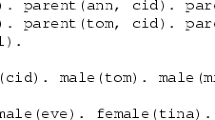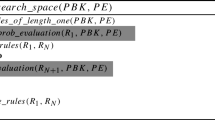Abstract
Since learning with Inductive Logic Programming (ILP) can be regarded as the search problem through the hypotheses space, it is essential to reduce the search space in order to improve the efficiency. In the propositional learning framework, an efficient admissible search algorithm called OPUS (Optimized Pruning for Unordered Search) has been developed. OPUS employed the effective pruning techniques for unordered search and succeeded in improving the efficiency. In this paper, we propose an application of OPUS to an ILP system Progol. However, because of the difference of representation language, it is not applicable to ILP directly. We make the conditions clear under which the pruning techniques in OPUS can be applied in the framework of Progol. In addition, we propose a new pruning criterion, which can be regarded as inclusive pruning. Experiments are conducted to assess the effectiveness of the proposed algorithms. The results show that the proposed algorithms reduce the number of candidate hypotheses to be evaluated as well as the computational time for a certain class of problems.
Preview
Unable to display preview. Download preview PDF.
Similar content being viewed by others
References
Blockeel, H. and De Raedt, L.: Relational Knowledge Discovery in Databases, Proc. of the Sixth International Workshop on Inductive Logic Programming, pp. 199–211, 1996.
Blockeel, H., Dehaspe, L., Demoen, B., Janssens, G., Ramon, J. and Vandecasteele, H.: Executing query packs in ILP, Proc. of the Tenth International Conference on Inductive Logic Programming, pp. 60–77, 2000.
Blockeel, H., Demoen, B., Janssens, G., Vandecasteele, H. and Van Laer, W.: Two Advanced Transformations for Improving the Efficiency of an ILP System, Cussens, J. and Frisch, A. editors, Tenth International Conference on Inductive Logic Programming, Work-in-Progress Reports, pp. 43–59, 2000.
Brockhausen, P. and Morik, K.: Direct Access of an ILP Algorithm to a Database Management System, MLnet Sponsored Famiiarization Workshop, Data Mining with Inductive Logic Programming, 1996.
Dehaspe, L. and Toivonen, H.: Discovery of frequent datalog patterns, Data Mining and Knowledge Discovery, Vol. 3, No. 1, pp. 7–36, 1999.
De Raedt, L.: Advances in Inductive Logic Programming, IOS Press, Ohmsha, 1996.
Dolsak, B. and Muggleton, S.: The application of Inductive Logic Programming to finite element mesh design, In S. Muggleton (ed.), Inductive Logic Programming, Academic Press, London, 1992.
Džeroski, S.: Inductive Logic Programming and Knowledge Discovery in Databases, in U.M. Fayyad, G. Piatetsky-Shapiro, P. Smyth and R. Uthurusamy (eds.), Advanced in Knowledge Discovery and Data Mining, Chapter 5, pp. 117–152, AAAI Press/ The MIT Press, 1996.
Fujita, H., Yagi, N., Furukawa, K. and Ozaki, T.: A New Design and Implementation of Progol by Bottom-up Computation, Proc. of the Sixth International Workshop on Inductive Logic Programming, pp. 163–174, 1996.
Fürnkranz, J.: Pruning Methods for Rule Learning Algorithms, S. Wrobel (ed.) Proc. of the Fourth International Workshop on Inductive Logic Programming, pp. 321–336, GMD-Studien, Nr. 237, 1994.
Fürnkranz, J.: Top-down pruning in relational learning. In A.G. Cohn (ed.), Proc. of the Eleventh European Conference on Artificial Intelligence (ECAI-94), pp. 453–457, Amsterdam, The Netherlands, John Wiley & Sons, 1994.
Fürnkranz, J.: A Tight Integration of Pruning and Learning (Extended Abstract). In N. Lavrac and S. Wrobel (eds.), Proc. of the Eighth European Conference on Machine Learning (ECML-95), pp. 291–294, Crete, Greece, 1995.
Igarashi, S., Ozaki, T., Ueno, K. and Furukawa, K.: Analysis of respiration during musical performance by ILP, Eleventh International Conference on Inductive Logic Programming, Work-in-Progress Report, 2001.
Lavrač, N., Džeroski, S. and Numao, M.: Inductive Logic Programming for Relational Knowledge Discovery, New Generation Computing, Vol. 17, No. 1, pp. 3–23, 1999.
Matsui, T., Inuzuka, N., Seki, H. and Itoh, H.: Comparison of Three Parallel Implementations of an Induction Algorithm, Proc. of the Eighth International Paralle Computing Workshop, pp. 181–188, 1998.
Muggleton, S. H., Bain, M. E., Hayes-Michie, J. and Michie, D.: An experimental comparison of human and machine learning formalisms, Proc. of the Sixth International Workshop on Machine Learning, 1989.
Muggleton, S.: Inductive Logic Programming, New Generation Computing, Vol. 8, No. 4, pp. 295–317, 1991.
Muggleton, S.: Inverse Entailment and Progol, New Generation Computing, Vol. 13, pp. 245–286, 1995.
Muggleton, S.H.: Learning stochastic logic programs, Proc. of the AAAI 2000 workshop on Learning Statistical Models from Relational Data, AAAI, 2000.
Nienhuys-Cheng, S.-H. and De Wolf, R.: Foundations of Inductive Logic Programming, Springer, 1997.
Ohwada, H., Nishiyama, H. and Mizoguchi, F.: Concurrent Execution of Optimal Hypothesis Search for Inverse Entailment, Proc. of the Tenth International Conference on Inductive Logic Programming, pp. 165–173, 2000.
Ozaki, T., Furukawa, K., Murakami, T., and Ueno, K.: Realizing Progol by Forward Reasoning, Proc. of the Seventh International Workshop on Inductive Logic Programming, pp. 227–234, 1997.
Ozaki, T. and Furukawa, K.: Improving Search Algorithm in Progol integrated with Relational Databases, SIG-FAI/KBS-902, pp. 83–88, 1999. (in Japanese)
Ohara, K., Babaguchi, N. and Kitahashi, T.: An Efficient Hypothesis Search Algorithm based on Best-Bound Strategy, J. Cussens and A. Frisch (Eds.), Tenth International Conference on Inductive Logic Programming, Work-in-Progress Reports, pp. 212–225, 2000.
Santos Costa, V., Srinivasan, A. and Camacho, R.: A note on two simple transformations for improving the efficiency of an ILP system, Proc. of the Tenth International Workshop on Inductive Logic Programming, pp225–242, 2000.
Tamaddoni-Hezhad, A. and Muggleton, S. H.: Searching the subsumption lattice by a genetic algorithm, J. Cussens and A. Frisch (Eds.), Proc. of the Tenth International Conference on Inductive Logic Programming, LNAI 1866, pp. 243–252, Springer, 2000.
Shapiro, E. Y.: Inductive Inference of Theories from Facts, Research Report 192, Department of Computer Science, Yale University, 1981.
Sebag, M. and Rouveirol, C.: Tractable induction and classification in FOL, Proc. of the Fifteenth International Joint Conference on Artificial Intelligence, pp. 888–893, 1997.
Shimazu, K. and Furukawa, K.: KDD System, DB-Amp-Design, Implementation and Its Application to an Expert System-, Journal of Japanese Society for Artificial Intelligence, Vol. 15, No. 4, pp. 629–637, 2000. (in Japanese)
Srinivasan, A.: A study of two sampling methods for analysing large datasets with ILP, Data Mining and Knowledge Discovery, Vol. 3, No. 1, pp. 95–123, 1999.
Srinivasan, A.: A study of two probabilistic methods for searching large spaces with ILP, Data Mining and Knowledge Discovery (under review), (http://web.comlab.ox.ac.uk/oucl/work/ashwin.srinivasan/ pubs.html), 2000.
Ullman, J. D.: Principles of Database and Knowledge-base Systems. Computer Science Press, 1988.
Webb, G. I.: OPUS: An Efficient Admissible Algorithm for Unordered Search, Journal of Artificial Intelligence Research, Vol. 3, pp. 431–465, 1995.
Webb, G. I.: Inclusive Pruning: A New Class of Pruning Axiom for Unordered Search and its Application to Classification Learning, Proc. of the Nineteenth Australian Computer Science Confrence, pp. 1–10, Melbourne, January, 1996.
Webb, G. I.: Efficient search for association rules, Proc. of KDD-2000, Bonston, MA, August, 2000.
Yamamoto, A.: Which Hypotheses Can Be Found with Inverse Entailment?, Proc. of the Seventh International Workshop on Inductive Logic Programming, pp. 296–308, 1997.
Author information
Authors and Affiliations
Editor information
Editors and Affiliations
Rights and permissions
Copyright information
© 2001 Springer-Verlag Berlin Heidelberg
About this paper
Cite this paper
Ozaki, T., Furukawa, K. (2001). Application of Pruning Techniques for Propositional Learning to Progol. In: Rouveirol, C., Sebag, M. (eds) Inductive Logic Programming. ILP 2001. Lecture Notes in Computer Science(), vol 2157. Springer, Berlin, Heidelberg. https://doi.org/10.1007/3-540-44797-0_17
Download citation
DOI: https://doi.org/10.1007/3-540-44797-0_17
Published:
Publisher Name: Springer, Berlin, Heidelberg
Print ISBN: 978-3-540-42538-0
Online ISBN: 978-3-540-44797-9
eBook Packages: Springer Book Archive




